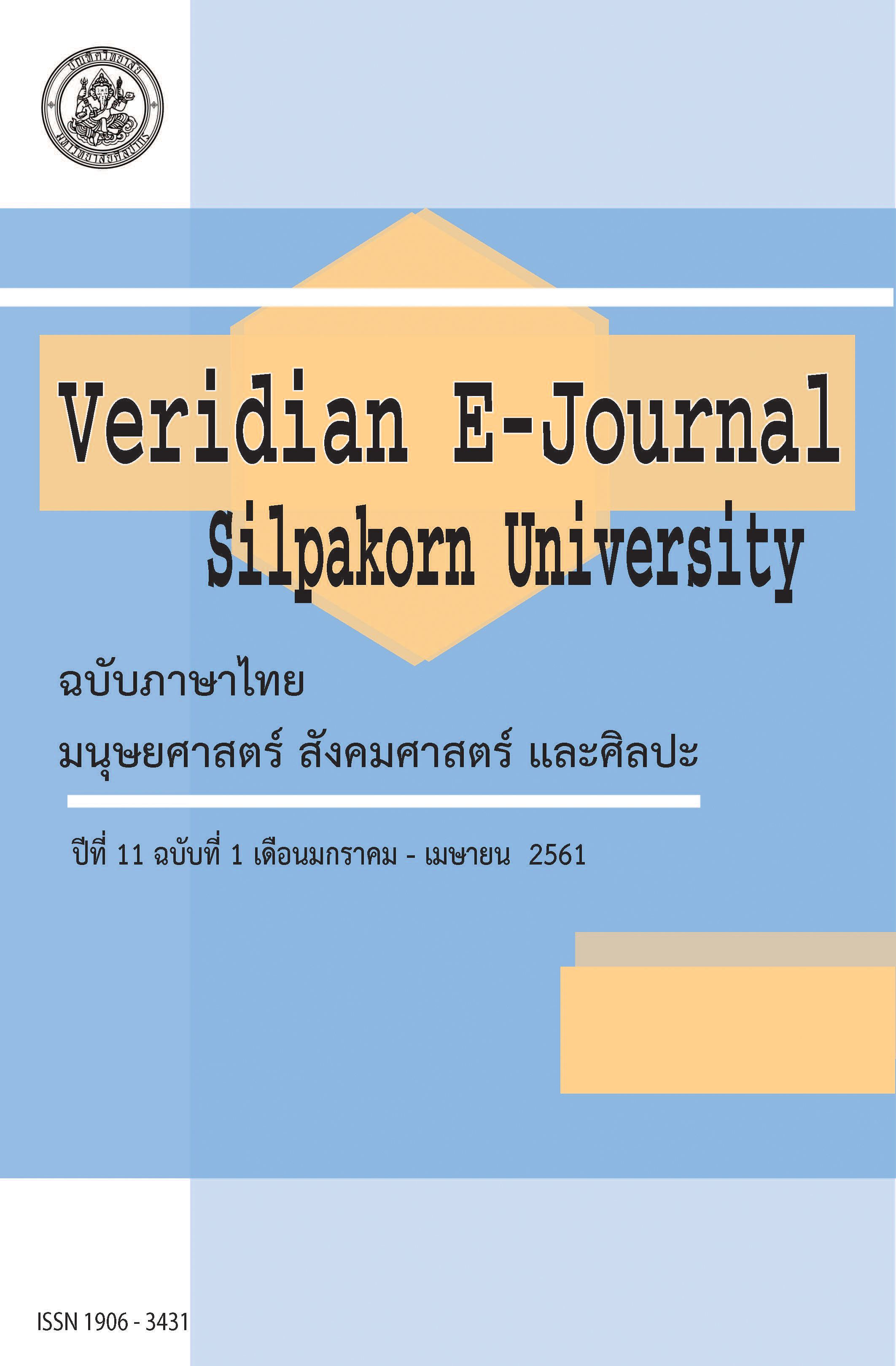การประเมินหลักสูตรหมวดวิชาศึกษาทั่วไป มหาวิทยาลัยศรีนครินทรวิโรฒ (The Curriculum Evaluation of General Education at Srinakharinwirot University)
Main Article Content
Abstract
การวิจัยครั้งนี้มีวัตถุประสงค์เพื่อประเมินหลักสูตรหมวดวิชาศึกษาทั่วไประดับปริญญาตรีปี พ.ศ. 2552 มหาวิทยาลัยศรีนครินทรวิโรฒ เพื่อเป็นแนวทางในการพัฒนาหลักสูตรหมวดวิชาศึกษาทั่วไป ปี พ.ศ. 2560 และให้สอดคล้องตามกรอบมาตรฐานคุณวุฒิระดับอุดมศึกษาแห่งชาติ (Thai Qualifications Framework for Higher Education : TQF) และอัตลักษณ์มหาวิทยาลัยศรีนครินทรวิโรฒ โดยใช้แนวคิดการประเมินหลักสูตรที่ยึดวัตถุประสงค์เป็นหลักของแฮมมอนด์ ใน 3 มิติ ได้แก่ มิติด้านการบริหารหมวดวิชาศึกษาทั่วไป มิติด้านการจัดการเรียนการสอน และมิติด้านพฤติกรรมผู้เรียน กลุ่มตัวอย่างประกอบด้วยผู้สอนและผู้มีส่วนเกี่ยวข้องในหมวดวิชาศึกษาทั่วไปจำนวน 30 คน เครื่องมือที่ใช้ในการเก็บรวบรวมข้อมูลเป็นแบบสอบถามประมาณค่า 5 ระดับ สถิติที่ใช้ในการวิเคราะห์ข้อมูล ได้แก่ การแจกแจงความถี่ ค่าร้อยละ ค่าคะแนนเฉลี่ย และค่าความเบี่ยงเบนมาตรฐาน มีการสนทนากลุ่มและการสัมภาษณ์ผู้บริหารฝ่ายวิชาการผู้ใช้หลักสูตรหมวดวิชาศึกษาทั่วไป พ.ศ. 2552 มหาวิทยาลัยศรีนครินทรวิโรฒ ผลการวิจัยแบ่งออกเป็น 3 มิติดังนี้
มิติด้านการบริหารหมวดวิชาศึกษาทั่วไป ความคิดเห็นของมิติด้านการบริหารหมวดวิชาศึกษาทั่วไป ของ มหาวิทยาลัยศรีนครินทรวิโรฒ โดยเฉลี่ยอยู่ในระดับมาก (x= 4.18, S.D.= 0.13) ผลจากการสนทนากลุ่มในประเด็นมิติด้านการบริหารหมวดวิชาศึกษาทั่วไป โดยมีผู้แทนจากมหาวิทยาลัยเทคโนโลยีพระจอมเกล้าธนบุรี มหาวิทยาลัยราชภัฏจันทรเกษม มหาวิทยาลัยศรีปทุม และมหาวิทยาลัยศรีนครินทรวิโรฒ พบว่ามีความคิดเห็นมุมมอง และวิธีการบริหารที่แตกต่างกันในแต่ละมหาวิทยาลัย
มิติด้านการจัดการเรียนการสอน ความคิดเห็นของด้านมิติด้านการจัดการเรียนการสอน โดยเฉลี่ยอยู่ในระดับมากที่สุด (x= 4.64, S.D.= 0.08) ผลจากการสนทนากลุ่ม ในประเด็นมิติด้านการจัดการเรียนการสอน พบว่า ผู้แทนจากมหาวิทยาลัยที่เข้าร่วมสนทนา ส่วนใหญ่จัดการเรียนการสอนแบบ Active Learning แต่บางรายวิชาใช้การจัดกิจกรรมเป็นหลัก โดยบรรยายในห้องเรียนขนาดใหญ่ อัตราส่วนระหว่างผู้สอนและผู้เรียนยังไม่สมดุล คือ ผู้สอน 1 คน : ผู้เรียน 100 คน มิติด้านพฤติกรรมผู้เรียน ความคิดเห็นของมิติด้านพฤติกรรมผู้เรียน โดยเฉลี่ยอยู่ในระดับมาก (x= 4.18, S.D.= 0.10) ผลจากการสนทนากลุ่ม พบว่า ผู้แทนจากมหาวิทยาลัยที่เข้าร่วมสนทนา มีการประเมินผลการเรียนรู้ครบใน 5 ด้าน ตามกรอบมาตรฐานคุณวุฒิระดับอุดมศึกษาแห่งชาติ ได้แก่ ด้านคุณธรรม จริยธรรม ด้านความรู้ ด้านทักษะทางปัญญา ทักษะความสัมพันธ์ระหว่างบุคคลและความรับผิดชอบ ทักษะการวิเคราะห์เชิงตัวเลข การสื่อสารและการใช้เทคโนโลยีสารสนเทศ
แนวทางการพัฒนาหลักสูตรหมวดวิชาศึกษาทั่วไป ปี พ.ศ.2560 เพื่อให้สอดคล้องตามกรอบมาตรฐานคุณวุฒิระดับอุดมศึกษาแห่งชาติและอัตลักษณ์มหาวิทยาลัยศรีนครินทรวิโรฒ คือการจัดหลักสูตรแบบบูรณาการ (Integrated curriculum) ที่รวมประสบการณ์ในการเรียนจากหลาย ๆ สาขาวิชามาจัดเข้าเป็นกลุ่มหรือหมวดหมู่ โดยเน้นทักษะที่ตัวผู้เรียนและปัญหาทางสังคมเป็นประเด็นในการชี้นำความรู้หลัก โดยการพัฒนาหลักสูตรเป็นแบบหลักสูตรสหสัมพันธ์ (correlate curriculum) ที่ผู้สอนในแต่ละรายวิชาสามารถวางแผนร่วมกันในการจัดประสบการณ์เรียนรู้ให้มีความสัมพันธ์กัน โดยใช้เนื้อหาหลาย ๆ วิชามาช่วยกันสร้างองค์ความรู้ให้ผู้เรียน การวัดประเมินผลผู้เรียนสามารถทำได้หลายรูปแบบ ต้องไม่เน้นวัดความรู้ ความจำ เรียนแล้วต้องเกิดทักษะ
The purpose of this research was to evaluate Srinakharinwirot University’s General Education cirriculum (Bachelor’s degree level, B.E. 2552) as a guideline for the development of the general education curriculum for B.E. 2560 (2017) academic year in accordance to Thai Qualifications Framework for Higher Education (TQF) and the unique identity of the University. The research used Hammond’s objective-driven curriculum evaluation model to assess all 3 dimensions: institution, instruction, and learning outcomes. The samples groups were 30 instructors. The research instrument used for collecting data was a five-rating scale questionnaire, focus group and informal interview of the academic administrators. Frequency, percentage, arithmetic mean and standard deviation were utilized for data analysis.
Institution: The opinions of the administration of General Education at Srinakharinwirot University were statistically at much appropriate level (x= 4.18, S.D.= 0.13). Focus group discussions by representatives from King Mongkut’s University of Technology Thonburi, Chandrakasem Rajabhat University, Sripatum University, and Srinakharinwirot University yielded different opinions and perspectives in the implementation methods.
Instruction: The opinions of the instruction of general education at Srinakharinwirot University were statistically at maxmimum appropriate level (x= 4.64, S.D.= 0.08). Focus group discussions found that most of the University’s representatives used active learning method but in some curriculums activity-based learning was used. The instruction’s model in liberal art curriculum were active learning in diversities which are self-directed learning, team learning, collaborative learning were most appropriate level. The ratio of the instructors and students, which was 1:100, was not balanced.
Learning outcomes: the opinions were statistically at much appropriate level (x= 4.18, S.D.= 0.10). Focus group discussions by the University representatives were evaluated all 5 domains of the learning outcome according to the national curriculum standards: ethical and moral development, knowledge, cognitive skills, interpersonal skills and responsibility, as well as analytical and communication skills.
The guideline for the development of the general education curriculum for B.E. 2560 (2017) academic year in accordance to Thai Qualifications Framework for Higher Education (TQF) and the unique identity of the University would be focused on the integrated curriculum, administration that combined learning experiences from multiple disciplines into groups or categories, emphasizing on learners and social issues. Using correlated curriculum method to develop the curriculum, instructors would be able to plan collaboratively to provide related learning experiences by combining multiple learning contents into knowledge. The evaluation of learners could be done in many shapes and forms but should not be focused solely on knowledge and memorization, rather it should be on learning to develop new skills.
